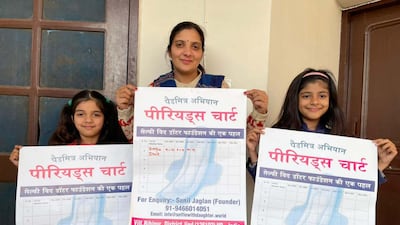Doctors have encouraged UAE companies to follow Spain’s lead and offer menstrual leave to female staff.
The European country hit the headlines when it announced it was considering introducing legislation that would allow women to take time off when suffering from period pain.
Dr Lubna Amhad, obstetrician and gynaecologist at Fakeeh University Hospital in Dubai, said companies should have a policy that allows women the opportunity to take time off if they feel they need it when suffering from menstrual pain.
She also said it was time for the subject to lose its status as a taboo and that women should be empowered to talk about it.
“Many companies and even colleagues look at period pain as a drawback in the workforce,” she said.
“They see it as something that affects their availability and productivity. However, period pain is as much a natural phenomenon as birthing.
“If we can have official maternity leave, then menstrual leave should also be welcomed.”
She said introducing menstrual leave could improve employee productivity, given that women make up almost half of the world's corporate workforce.
“To consider menstrual leave is to consider happy employees, who in turn will gain better productivity levels and lower stress levels,” she said.
“It should be best left to the women's own choice. Firms can surely create a provision and leave it to their women employees to use it or not.”

The announcement by the Spanish government could act as a catalyst to remove the stigma around women’s periods, she said.
“A lot of other countries may follow suit,” she said. "It is also up to the women and people around them to feel free while discussing the subject.
“Doctors, hospitals and other organisations should focus more on spreading awareness on the topic, so as to bring more acceptance in society.”
Under the plans drafted by the Spanish government, female employees could be entitled to take up to three days' leave a month if they suffer from severe period pain.
Another doctor in Dubai said offering menstrual leave would go a long way towards helping maintain the dignity of women in the workplace.
“As we strive to increase the participation of women in the workforce, it is imperative that we find ways and means to support them during days of the month when they feel vulnerable,” said Dr Sonia Chaudhary, specialist obstetrician and gynaecologist at Medcare Women and Children Hospital.
_________________________________________
'Period charts' help Indian women end menstruation shame - in pictures










_________________________________________
She said the level of pain varies from person to person and many women feel ashamed to talk about it with their colleagues.
“Most women go through severe pain for a day or two but do not take leave,” said Dr Chaudhary.
“However, there are also many who suffer from endometriosis and have fibroids in their uterus, which leads to excessive pain and bleeding that can affect their daily routine.
“Their hygiene can be compromised, too, by having to frequently change their sanitary napkins.
“Many feel ashamed to share it with colleagues, which can be down to peer pressure as it can make them feel weak and vulnerable.”
Menstrual leave is only offered by a handful of countries including Japan, Indonesia, Taiwan, South Korea and Indonesia.
The practice has been in place for more than 70 years in Japan. However, a 2017 survey by the Japanese government said less than 1 per cent of women use menstrual leave.
Women in Zambia are also entitled to take a day off each month for menstrual leave, although this is not included as part of normal sick leave – for which employees are allowed up to 30 days every year.
A company in Dubai currently offers women the option to take one day each month for menstrual leave.
James Michael Lafferty, of Fine Hygienic Holding, a firm that makes a range of products including tissues and face masks, said: “It’s an incentive to attract and retain the best available talent.
“We actually see it as potentially being a competitive advantage.
“Our female staff don’t have to take it if they don’t feel the need but it’s an option to be used entirely at their discretion.”
One common complaint about the practice is that it could discriminate against male members of staff, who could have fewer days of leave than their female colleagues.
A leading recruiter said the solution could be to offer all staff members leave for “personal issues”.
“The best idea might be to take an all-encompassing approach rather than put a sticker on every single type of leave,” said David Mackenzie, group managing director of recruiters Mackenzie Jones.
“Sometimes people might need time for a number of issues, such as anxiety or stress, menstrual pain as well, so it makes sense to be flexible about offering them the option of extra leave if needed.”


